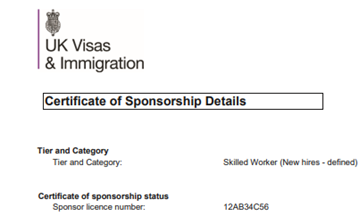The National Minimum Wage (NMW) is a cornerstone of UK employment law — and in 2025, it's more important than ever that employers get it right.
Whether you're hiring part-time staff, apprentices, or sponsored migrant workers, failing to comply with minimum wage rules can lead to Home Office audits, financial penalties, and even your sponsor licence revoked.
This guide breaks down the 2025 minimum wage rates, who qualifies, how to stay compliant — and what happens if you don’t.
What Is the National Minimum Wage?
The National Minimum Wage (NMW) is the legal minimum hourly pay most UK workers are entitled to. The rate varies based on age and employment status — with separate categories for apprentices and younger workers.
Workers aged 21 and over qualify for the National Living Wage (NLW), a higher bracket aimed at reflecting the actual cost of living.
Not sure how much you should pay a sponsored worker? Use our Minimum Salary Calculator.
2025 NMW Rates: What’s Changed?
From 1 April 2025, the UK Government increased the minimum wage across all age groups. Here’s a quick summary:
Make sure your payroll systems are updated and that sponsored workers meet the appropriate salary thresholds, or you risk breaching your sponsor licence duties.
Who Qualifies for NMW?
Nearly all workers in the UK are entitled to the NMW, including:
- Full-time and part-time employees
- Casual staff and zero-hour workers
- Apprentices (with some caveats)
- Sponsored workers under the skilled worker visa or health and care worker visa
- Agency and seasonal workers
Even domestic carers and cleaners must be paid at least the NMW, unless exempt (e.g. family members).
Calculating NMW for Different Pay Structures
To stay compliant, you must ensure the effective hourly rate meets or exceeds the legal minimum, regardless of how you pay your staff.
Hourly (Time Work)
Divide gross pay by total hours worked.
Salaried Workers
Divide annual salary by total contracted hours.
Output Work (e.g. per item)
You must prove the average output allows an "average worker" to earn at least NMW.
Unmeasured Work
Agree a “daily average hours” with the worker and ensure pay meets the minimum based on that.
Use the visa fees calculator to factor in salary bands and government fees for migrant workers.
What Counts as Working Time?
Include:
- Time at the workplace while required to be working or on call
- Travel between assignments (not commuting)
- Training time
- Sleep-in shifts, if required to remain available for work
Exclude:
- Breaks, holidays, or sick leave
- Unpaid voluntary arrangements
- Commuting
Employer Responsibilities Under NMW Law
You’re legally required to:
- Pay the correct NMW rate based on worker age and status
- Keep payroll records for at least 3 years
- Provide written payslips
- Avoid unlawful deductions (e.g. for uniforms or training)
- Review pay annually, especially when staff age into a new bracket
If you're a sponsor licence holder, failure to comply may result in a sponsor licence application refused or sponsor licence revocation.
What Happens If You Don’t Comply?
The consequences are severe:
- Fines up to £20,000 per underpaid worker
- Requirement to repay arrears at current rates
- Public naming and shaming by the government
- Tribunal claims by affected workers
- Criminal prosecution in extreme cases
For immigration sponsors, this could also impact your ability to assign a CoS (certificate of sponsorship) or continue hiring internationally.
When Should You Increase Pay?
You must increase wages when:
- New NMW/NLW rates take effect in April
- A worker ages into a new wage band
- An apprentice finishes their first year and turns 19
Wage changes apply from the next pay reference period (e.g. weekly, monthly) following the change.
Budgeting for Wage Increases
Plan ahead to absorb NMW rate rises without harming your margins:
- Reforecast your payroll budgets
- Adjust pricing models
- Use platforms like Borderless to automate wage tracking and stay compliant
Sector Spotlight: Minimum Wage in the Care Sector
For care providers, compliance with the NMW is even more critical:
- Many care workers are migrants, making sponsor licence compliance essential
- Roles often involve sleep-ins or unmeasured work — which complicates NMW calculations
- Failing to meet NMW rules can trigger CQC inspections, CQC ratings downgrades, or CQC enforcement
Learn how to stay compliant with our care-focused guides:
10 Common NMW Myths (Busted)
Myth 1: Only full-time staff qualify
All workers — including part-time, temporary, and zero-hour — are entitled.
Myth 2: Tips and service charges count toward NMW
They don’t. NMW must be paid before tips.
Myth 3: You can deduct for uniforms or training
Not if it brings pay below the NMW.
Myth 4: Small businesses are exempt
No business is exempt — no matter the size.
Myth 5: Apprentices stay on the apprentice rate forever
Once they’re 19+ and past year one, they get age-based NMW.
Myth 6: Volunteers don’t qualify, so interns don’t either
Unpaid internships often breach NMW law unless they’re true voluntary roles.
Myth 7: You only need to check rates once per year
You must adjust wages whenever age bands change or new NMW rates take effect.
Myth 8: Accommodation always reduces NMW risk
Wrong. Overuse of accommodation offset can lead to underpayment.
Myth 9: Salary sacrifice schemes count toward NMW
They don’t. NMW is based on take-home pay after deductions.
Myth 10: If a worker agrees to below-NMW pay, that’s fine
It’s not. NMW is a legal right, not a negotiable benefit.
Final Thoughts
Paying below the legal minimum isn’t just a risk — it’s a business liability.
Whether you’re managing payroll for a care provider, hospitality team, or tech startup, staying on top of NMW compliance is critical. Use tools like the sponsor management system (SMS) or contact us at Borderless for help navigating sponsor licence compliance.
Get Expert Help
Want to stay ahead of wage changes, immigration rules, and payroll compliance?
Get in touch with our team at Borderless to learn how we help UK employers simplify right to work checks, visa tracking, and NMW compliance.
Automate Home Office Audits with Borderless
The Borderless platform provides a centralized system for all sponsorships, automating reminders for key tasks and ensuring best practices across your organization, simplifying audit preparation and ongoing compliance.






